I’ve been listening to the Creepy Cove Community Church Podcast since I first discovered it about a year ago. What really drew me to the pod was the way creator Reverend Peter Laws’ combined my beloved horror movies and a heavy dose of humor with uplifting, thought-provoking messages based on a belief in Jesus Christ and The Holy Bible. As a Christian who loves horror, this pod really resonates with with me. The structure of the show is perfectly balanced, taking place in a church on a windswept cliff overlooking the ocean, and filled with horror icon dialogue, quirky characters, a short Bible reading, and an inspiring message from Peter himself. Hailing from the UK, Peter is a Jack of all trades, spending time on this podcast as well as another, plus composing and writing his own music, writing books—both fiction and non-fiction—and articles for The Fortean Times magazine, reviewing films, doing speaking engagements, consulting up-and-coming authors on making their work flow, creating YouTube videos, as well as spending a few nights a week as a Chaplain at a local nursing home. I became so enamored by this podcast that I hunted Peter down so I could ask him about his entry into horror and faith.
“Looking back on it, I think horror was a significant factor in my journey towards spirituality, because it was the only genre that took spirituality or the supernatural seriously.” — Peter Laws
PopHorror: So I want to talk about your journey into horror, your journey into Christianity, and how those two things combined.
Peter Laws: I got into horror long before I got into Christianity. I sometimes phrase it as “I met Dracula way before I met God.” I just wasn’t interested in church and things like that growing up, because I felt like it was going to be a restrictive place that would remove my personality and stamp out my love of horror. Horror was an interest that I’ve had since since birth. I can’t say there was a precise time when I suddenly got switched on to scary things. I think for me, they were always the sorts of stories I loved, the mysteries and monsters and that sort of thing. Those were the topics that made me excited. So while my friends were interested in sports or fighting with each other, I got excited when I thought maybe the house on the way to school could be haunted. I would read a Stephen King novel, and then I’d start thinking, “What if vampires do exist? What happens if there’s a vampire in my hometown?” These sorts of questions, I think, turn up my colors of reality.
Like I said earlier, I wasn’t really interested in Christianity. Actually, I was really antagonistic towards Christianity growing up. Horror was something that I held over Christians, specifically my Religious Studies teacher. The Christians I knew at school, they just wound me up. They seemed to want to make me into a Stepford wife. It was a bit unfair, really, because I never really fully got to know them. I just saw them as boring, and I started to react against that. So I would give my teacher quite a hard time. I was really well behaved in most of my classes… except religious education. I would get there early, get the Bibles and flick through to where it said, “Satan,” and I would scrawl a big circle around it. I wasn’t a devil worshiper. I just wanted to do something shocking. Or when the teacher came in, and we’ll be talking about Christianity. I remember at one point she was talking about sex before marriage. And I was like, “Miss, that’s so silly. How do you know that you’re even going to fit together physically? You have to make sure that those parts are designed for each other!”
(both laugh)
I remember my friends and I used to go drinking in the woods. This was before we were allowed to go into pubs, because we were too young. So we would just buy cooking Sherry or really cheap wine (laughs). One night, I had found out where the local church was having a Bible study group. After drinking for a while, I told my friends, “I’ve got stuff to do.” I sought out this Bible study group, knocked on the door and said, “Could I come in to your Bible thing?” And they said, “Yes, of course!” So I went in and fired questions at them about how unfair God was and how Christianity was silly and stuff. But I had also taken a pre-written note saying that all the witches in the local Coven were going to destroy this church or something.
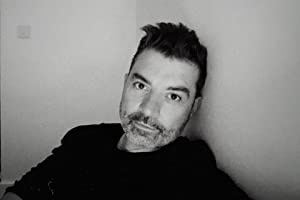
It was trying to give them the impression that there was a big mass conspiracy of witches and Satanists out to get them. I stuffed it into the side of the sofa. I just thought, “One day, they’re going to pick that up.” I realize now that it was incredibly juvenile and stupid. But at the time, I thought it was funny. But something about Christianity was was making me react. Some people are pretty lukewarm about it, but it’s the people who are really antagonistic towards it… There’s something about it that interests them but frustrates them. That was me. So it was only when I became a student at University and began meeting Christians who were intelligent and not like stereotypes I knew that I reassessed it. To my utter shock, I became a Christian. That was quite a surprise.
It was just all of this angry young man stuff. But I wasn’t angry with life. I was very happy. I thought life was great. I had a wonderful time at school. I loved it. So it wasn’t that sort of anger. It was metaphysical. Cosmic unhappiness.
PopHorror: And you rebelled against something?
Peter Laws: Yeah, precisely. One of the things that I thought about Christians was that they wanted to restrict me from thinking. I thought they were saying, “Don’t listen to certain types of music and don’t watch certain types of films like Cannibal Holocaust or The Exorcist.” Whereas when I watched those films that were supposedly blasphemy, particularly The Exorcist, they were the things that made me start asking big, deep, spiritual questions. Looking back on it, I think horror was a significant factor in my journey towards spirituality, because it was the only genre that took spirituality or the supernatural seriously. It actually said things like maybe there’s life after death, or maybe there’s something that can be an objective evil in the world.
But I’d only been exposed to Christians who thought that way. I had no idea there was a whole world out there of Christian spirituality that actually could be a bit more nuanced or experimental. I grew up in the late 1980s, early 90s during the Satanic Panic with people thinking that the devil was just waiting to corrupt everyone. I wasn’t aware of it at that point, because I hadn’t hung out with a lot of Christians. But when I became a Christian, I started to encounter people who were were much more robust in their problems with my interests. Whereas before, a Christian school teacher or friend might say, “Oh, you shouldn’t watch that stuff,” and then drop it. When I became a Christian and started meeting other Christians, some of whom were into the Satanic Panic, they would say, “No, you’re opening the doorway to the demonic!”
To be fair, my interest in spirituality began not with Christianity but with the paranormal. I remember getting a spell book from a friend from school. I don’t remember much about it, just that it had a green cover with a big pentagram on the front. There was astral projection in there. So I was trying that and had done so many Ouija board sessions and séances, because I just found that really interesting. Me and my friends would sometimes break into old, spooky places like the beautiful castle by the ocean called Dunstanburgh Castle. We hopped the fence to go in there to do a séance. And then I started doing it by myself… and it would move. I don’t know whether or not it was just me subconsciously pushing it or if there was something really spiritual happening there.

But this sort of stuff was seen by certain Christians as me being an evil satanic devil worshiper. But the aims were noble, and I think, understandable. I wanted evidence of the supernatural. Christians were saying to just believe. Put your guitar on and go watch VeggieTales. Don’t worry about the big questions that niggle you at night. I was more evidential. I thought that the paranormal people actually had stuff that you could put your hands on and move around, that there’s a bit more evidence of the supernatural. It doesn’t have to be God answering all I want to know. This is probably the the crux of it… All I want to know is, when I die, is it the end? Or is there something else? I’m scared of death; I still am really disturbed by it. And I want a sense of hope in that. So the interest in horror and the paranormal is a perfectly rational, reasonable, honorable aim… to seek comfort, to seek adventure, to seek the expansion of knowledge. So that’s why I’m not a Christian who would look at other people who are interested in those topics and say, “Don’t be messing with that stuff,” because it can be all part of the journey.
PopHorror: There’s also the idea of the Final Girl in slashers. The people in slasher movies are always getting killed off, but there’s always this one person that survives. Something terrible happens, but they survive. And in reality, people go through bad things, horrible things. But then they get through it and are maybe even better in the end. We all want to be the one who survives.
Peter Laws: Yes, true. And I would even go so far as to say that we’re rooting for the killer. Often in slasher films, you’ll find that they have a motivation for killing. Sure, it’s totally psychotic and unfair, but there’s usually a reason. It might be because the slasher was bullied when they were a kid or drowned because of the neglect of canoodling camp counselors. Often, there’s either a dysfunction or a revenge/justice type of thing going on. The slashers want to exact revenge. There’s that sense of justice, that something went wrong, and it needs to be addressed. We can’t just forget it.
It takes an unimaginative person to not see these links and just think that it’s all bad. I think a lot of people—not just Christians but people in general—who dismiss horror, often it comes down to personal taste rather than actual morality. Recently, people have been complaining about Squid Game. I don’t know if this is going on in [the US], but at the moment, it’s here [in the UK]. We have a shopping center in Manchester City, and for their Christmas decorations, they’ve built a full Red Light, Green Light setup with the girl from Squid Game and the guards. It looks amazing. And people are like, “This isn’t Christmassy! It’s disgusting, and it’s ruining the spirit of Christmas!” whereas let the kids just love it. Many people dismiss that as disgusting and wrong. How could you possibly like that sort of thing? Therefore, it must be evil. But they haven’t factored in the simple fact that they’re just not into it.
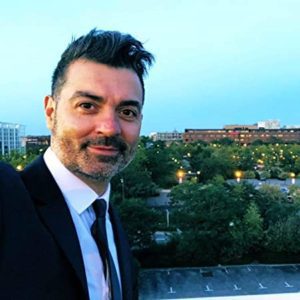
But rather than just stick with that, they put in all of this commentary. You can’t equate personal morality with taste. Morality is a more common thing that we share together, but taste is very different. And the people who enjoy these horror films, like me, you and your readers, are not rooting for real people to die, right? We’re not frothing at the mouth when someone gets stabbed on screen because we like the idea of someone getting stabbed in real life. I’d say it’s probably the precise opposite. Most horror people I’ve met are actually very sensitive to real world violence.
PopHorror: I totally agree! Horror fans are the nicest people I’ve ever met, and the genre celebrities I’ve met at cons are the most humble and friendly people. Also, horror fans are the ones who are most offended when the dog dies.
Peter Laws: Yes, they are, aren’t they? Actually, there was a time when I used to get disappointed that more children didn’t die in films. No, stop! Let me explain this, right? It was because when I used to watch films, if a child was in peril, I thought, “Well, I’m not that bothered. The kid’s gonna survive.” They always survive, you know? Or if the kid does die, the very rare time one does die, you’re not going to see it happen. And I used to get really disappointed. Not that I had any interest in real kids dying. That’s appalling. But in films, I used to think that was a shame. I thought, “This is a good opportunity to really cause me horror.” But something did change when I had kids myself. And I don’t assume that if you don’t have kids, you won’t have empathy for children. I don’t think that’s true. But in my case, it did change that. I started to notice that, after I’d had kids and I watched horror films where the kid got away, I was very relieved, and when the kid died, I was quite shaken.
That’s what’s great about about horror. You can analyze what disturbs you and what scares you. And it can teach you quite a lot about your own personality. You can start to figure out the specific fears that you have. It can be quite telling. You can almost do a little bit of personal therapy, making a mental note of what moments in horror frighten you. Some people get terrified when characters turn insane in horror films or when you can’t tell: Is it real or is it not real? For other people, it’s claustrophobia, or going blind, or the undead, or vampires, or whatever. There’s certain things that push buttons. And to me, that’s rich pickings for self-analysis. But I guess a lot of us don’t necessarily think that way and don’t assess what we’re watching in that way. But I think if you’re up for it, you can learn a bit about yourself.
PopHorror: I agree. I think also watching a horror movie makes you confront your mortality. You’re making the connection, and you’re saying, “Look, I’m gonna die. Everyone is. I accept it.” No one else wants to think about that. They think, “I don’t want to see scary stuff because that reminds me that I’m going to die someday.” But horror is confronting it.
Peter Laws: That’s very astute of you to say. I also think that’s true. And I think one of the reasons why I’ve been drawn to horror is because I’m disturbed by topics like violence and death and decay. For example, I’ve got a bit of trypophobia. I didn’t even know I had it until somebody mentioned trypophobia, and I Googled it. I was just horrified. I’ve still got images in my head of that sort of stuff. And that’s interesting, because it made me realize that I’m scared of decay. I’m scared of the concept of things falling apart, of me falling apart, of getting older. It’s all linked together.
I think art has always been a tool of reflection and an exploration of the human condition. To expect us not to think about those subjects that are so relevant—from death to decay to wounds to the fragility of the human body—is totally absurd. How could you possibly imagine a healthy society not trying to get their heads around that? In my nonfiction book, The Frighteners, I explore why people who are drawn to this sort of stuff.
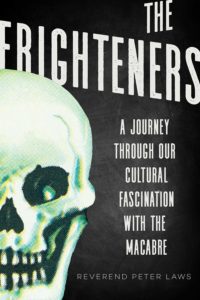
In New Guinea, there’s a tribe called the Gebusi tribe. They spend all of their time not talking about scary things. They’re not allowed to have violence in their rituals in any way. They can’t tell stories of murder or anything like that. And you would think that a society like that, one that has pushed all kinds of dark culture to the side, that they would be the key to happiness and contentment, but the Gebusi tribe have the highest homicide rate on the planet.
PopHorror: They’re so full of internal rage that they can’t express, and it bursts out of them.
Peter Laws: Yeah, because it’s a natural emotion. You can’t ignore it and pretend it’s not there. I’ve interviewed a few people for that book and asked them to be honest about the thoughts that they sometimes have. Respectable professionals were saying things like, “Yes, sometimes when I’m in a meeting, I visualized myself picking up my laptop and smacking it over the other person’s head repeatedly.” Or, “Yes, when I’m standing on the tube in London waiting to get on the train, the thought crosses my mind to jump in front of it or to push someone else in front it.”
When I first became a Christian, I was a youth pastor, and I was talking to teenagers. I would ask the higher ups, “Do you ever have these sorts of thoughts pop across your mind? Are you ever making a sandwich with a knife next to someone and the thought just crosses your mind, ‘Hey, I could stab that person’?” For some questions, they would say that if those thoughts ever cross your mind, it means you have a demon and it is trying to get you to murder someone or kill yourself. To me, that gives the devil way more power in our lives. The simple thing is that the brain sometimes thinks of random, weird stuff.
PopHorror: And the difference is, you think it but you don’t do it. Thoughts like that are like a release valve, something that lets the steam out a little bit. Can we talk more about The Frighteners? Which also just happens to be my favorite book in the subject.
Peter Laws: Is it? Well, thank you! So, I got to write a book called The Frighteners. In Britain, it’s called The Frighteners: Why We Love Monsters, Ghosts, Death, and Gore. But in America, they changed the title to The Frighteners: A Journey Through Our Cultural Fascination With The Macabre. They also added the Reverend on the front of the book there because Christianity is more a part of your culture, whereas in Britain and maybe in Europe, if you put Reverend on there, it’ll just put people off. So it just says Peter Laws and Britain. But that book is a long form response to a question that I get asked a lot, which is, “How could you possibly like this stuff? Do you think it’s unhealthy?” I was fascinated by that question, and I also wanted to have a decent answer for others. So I wrote this book. I got to travel to Transylvania, Rome, and all across Britain, meeting really interesting people and having quite a lot of crazy, sometimes scary, adventures, all to try and understand why human beings are drawn to the macabre.
PopHorror: We’re so spoiled now and separated by death nowadays. Even just 100 years ago, people died all the time from disease and war. It wasn’t a big deal. The idea of death was normal. But now, we don’t have to see that stuff if we don’t want to, so we don’t have to think about it and learn to live with it.
Peter Laws: Yes, that’s a good point. I talk about that specifically in a chapter called “Hiding The Bodies,” where I contrast today with Victorian times in Britain. There used to be a time when death was more visible and bodies would be in the parlor. A lot of people would have seen a dead body in their lives. It was a natural part of life. Yet, with the development of the insurance industry, the medical profession, and the understanding of contagious disease—where we know a body could be contagious, so get it out of the way—pushed the presence of real death away from us. I’m not necessarily campaigning to get back (laughs). I’m not trying to encourage people to have more corpses in their houses. But I am saying that we live in a society where we’re able to act as if it’s not even real.
And it’s amazing and surprising to me how many parents have never decided who would look after their children if they were to die. One of the reasons they don’t do that is because they think if they start talking about these topics, it will make it happen, like a superstition. So there’s a pushing away of it. So instead of it being in our parlor right in front of us, we start getting gothic novels that talk about death. And then we start seeing death in art and in films—particularly in zombie films—because we don’t have a lot of actual dead bodies in our lives. It’s very interesting that zombies—one of the biggest icons of horror over the last few decades, compiling all the dead bodies that we’ve hidden—are returning to our farmhouses and banging on our doors and saying, “Don’t you forget about me!” This is real. You can’t forget it. You’ve got to address it in some way. That’s pretty intense stuff.
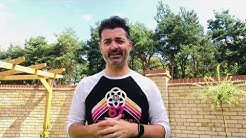
The function of art and culture is definitely to explore that, but horror is also there to entertain. It’s fun. It’s a good laugh, and it’s adventurous. And it’s also a bit anti-establishment. I find that some some people who like horror are willing to celebrate those things that are not quite the norm. I find a lot of people who are a little bit more open to horror have this ability to look beyond the black and white and see things in shades of grey. They can sit down and watch scary things where people die and somehow be okay with that. That’s quite a complex way of thinking. And I think that often is a sign of their intelligence. You find that horror fans can be quite nuanced and thoughtful. Not all of them—some of them can be very straight down the line—but a lot of a lot of them seem to be very open-minded.
I think mainstream folks wouldn’t wouldn’t go to a thriller or a superhero film and be okay with really extreme levels of horror in the story. That’s what I mean by horror fans being open-minded. They can sometimes see the attractions or positivity in some of the most messed up stories or the most messed up characters, like the thought that they can have compassion for Michael Myers, who is ultimately a bad guy. For example, there’s people celebrating Freddy Krueger as being cool. He’s wonderful. Let’s buy a glove for my kid and forgetting that Freddie is a messed up child molester. How are we celebrating that? But at the same time, it’s taking the rejects of society and saying, “Even they could be respectable somehow,” or “Let’s pay attention to them.” That’s quite a remarkable thing to do, I think. To be willing to look beyond the “He’s the hero!” and “He’s the baddie!” It’s complex stuff. And that’s why it’s so annoying and sad when people dismiss horror as being just about stabbing women. No, it’s not. It’s way more complicated.
“I find a lot of people who are a little bit more open to horror have this ability to look beyond the black and white and see things in shades of grey. They can sit down and watch scary things where people die and somehow be okay with that. That’s quite a complex way of thinking. And I think that often is a sign of their intelligence. You find that horror fans can be quite nuanced and thoughtful. Not all of them—some of them can be very straight down the line—but a lot of a lot of them seem to be very open-minded, I think.” — Peter Laws
PopHorror: Do you want to talk about your other books?
Peter Laws: Yeah! I’m the author and creator of a series of novels that feature a character called Matt Hunter. These books are normally found in the crime fiction section, but they do lend themselves to supernatural horror as well. Matt Hunter is an ex-church minister turned into an atheist professor. He basically spends his time writing books that debunk Christianity. He’s reminiscent of me when I was in my teen years. He also has celestial problems with God. But he’s also a normal, chilled out, relaxed person. He hasn’t got big issues. He’s not an alcoholic or divorced or estranged from his children like in a lot of crime fiction. He’s just a normal person who has issues with Christians, basically. Because of his previous time in ministry, he has great knowledge of Christianity and cults and all that sort of stuff. So he gets called in whenever there’s a murder that has a vague whiff of the ritualistic.
In the first book, Purged, he’s on the trail of a Christian serial killer who thinks the most loving thing to do is to baptize people as adults and get them ready for heaven. But then, as soon as they come up out of the water, he immediately murders them. That way, they won’t fall away from their faith, and they’ll be fast tracked straight to heaven. It’s that sort of stuff. The second book, Unleashed, is about poltergeists, and the third book, Severed, is about a weird cult who believe God The Father murdered Jesus The Son out of jealousy rather than that of self sacrifice. And the fourth book, Possessed, is about demonic possession and centers around the world’s first televised mass exorcism.
PopHorror: Matt Hunter is like the past Peter confronting the today Peter.
Peter Laws: Yeah, I think so. Although, the older I get, the more I’m okay with being a bit like Matt Hunter. There was a time when I used to think you had to make your mind up on certain things. You must be fully sure there absolutely is a God or there absolutely isn’t a God. You need to choose your side. The older I get, the more I’ve realized that belief is quite nuanced. Sometimes, it’s just about which direction your feet are pointing in. So I’m kind of open minded about these sorts of things. But my feet point more towards the “God exists” direction. But that doesn’t mean that I don’t sympathize, understand, and am sometimes attracted to the opposite idea of it. It makes sense in a way. But so does God existing, too. I don’t feel bad that I sometimes entertain one or the other. But on the whole, if you see me walking, I’m walking towards the God thing. That’s the one that I find, ultimately, to be the most persuasive, taking into account all the evidence and things in the universe and all that sort of stuff. But I don’t expect other people to fully believe that.
PopHorror: Everyone has the ability to go that in that direction, but free will stops people from choosing it sometimes. So you have to understand that people have free will. You can’t just beat him on the head with the Bible and say, “Believe this because I think it’s true.” Everyone has different levels of belief. It’s not only black and white, believe or don’t believe.
Peter Laws: Yeah, exactly. And I personally think that that is good. There are people like Richard Rohr, who was a Franciscan monk. He’s been quite helpful in the sense that he talks about how life is in two different compartments. The first part of your life is all about black and white thinking and things needing to make sense. And you want everything to be almost like a circuit board… that’s right, and that’s wrong. This is who I am, and this is who I am not. But as you grow older, you get more data about life, and things become a bit grayer. Let’s say you grow up in a Christian house in a Christian community. You go to a Christian college, and you’re told Muslims are evil, and they’re all going to Hell. That’s a very easy thing to hear in that kind of community for sure.
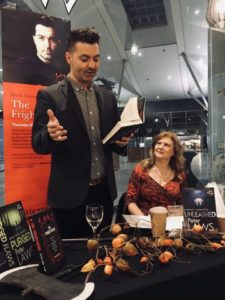
So, for a lot of your life, you may just simply think, “Oh, well, that’s the way it is.” But then as you get older, you leave the college and you go to work somewhere. And you happen to work alongside a Muslim colleague. You start getting to know them, and they’re great. It’s getting a bit more complicated now, because he’s now no longer just a stereotype. He’s an actual person, and you’re seeing good things in this person. You’re also noticing not so good things maybe in some of the Christian people you’ve known. And when that happens, it’s like a break down. And the black and white world that you were brought up in is maybe a bit more gray now. For some people, that is a sign that they’re getting wishy-washy or dodgy. They’re losing their faith, and they need to get back to the strict framework. Whereas Richard Rohr would say, “Actually, that’s what spiritual maturity looks like.” It happens when you start to have experiences of actual people in the actual world, and a mystery starts to bubble up. You start to get less fixated on some of the negotiable things, and you start really honing in on the stuff Jesus talked about like love and forgiveness.
PopHorror: You move into the New Testament.
Peter Laws: Yeah. In many ways, it’s essential. I don’t know how we got into that, but it’s quite interesting. So yeah, I wrote these novels and one nonfiction as well. I hope to do some more book writing in the future.
I used to do a podcast about 10 years ago called The Flicks The Church Forgot, which reviewed horror films from a Christian perspective. But in the pandemic, I started back into podcasting. I now do The Creepy Cove Community Church Podcast, which is quite peculiar, but seems to resonate with people. It’s basically fully immersive church services broadcast from a mysterious haunted fishing town. In the beginning of the pandemic, I noticed that a lot of my Christian friends were still getting connections with others and a sense of community because they were going to church digitally. So they were able to sit at home and still connect with other people in a regular way but online. I started to realize that it only works if you happen to be in a group that likes to do Zooms and stuff. Not everybody has access to that. And so I thought, “Well, how about I set up a church service that goes out, but because it’s digital, you don’t have any restrictions on where it is? And also have no restrictions on whether it even exists or not.” You could create a fictional church that could still perform many of the same things these other digital expressions of church were doing.
That’s why I came up with Creepy Cove, a horror-based church that exists in creepy cove by the sea in a town in which all horror movies actually happened. The central conceit of that is just to say that in Creepy Cove, we are all surrounded by vampires and werewolves and monsters and killers and stuff. But they’re all looking for a bit of hope amongst the horror. And aren’t we all? We’re all surrounded by monsters and scary things… either the monsters out there or the ones in our own psyches. We’re already in a world of scary things. The people of Creepy Cove are just looking for a bit of hope and a bit of encouragement and maybe even a good laugh. So that’s that’s what Creepy Cove is. It’s been a lot of fun to do. It’s a lot of hard work, because it’s an immersive, full service with sound effects and interviews, and I do a lot of the voices which is a bit embarrassing. But it was cheaper to do it that way than get people in to do them.
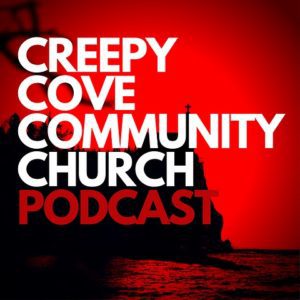
PopHorror: Plus, you write the hymns and music.
Peter Laws: Yup, I write the music and the songs and do all of the editing, I do basically everything. Recently, I’ve started getting guest speakers in. I enjoy doing it all, but it does take quite a long time. And I want them to go out on a consistent basis. I don’t like when people start a podcast and it fizzles out. It’s supposed to be every week, and they have no episode for like six weeks or something. So that’s why I’ve done this one in seasons to make sure I have breaks and stuff like anyway. And Creepy Cove has a related Patreon program where people can join, a place where they can join the congregation and get extra content, including a Members Only podcast from me. And then recently, I was delighted to be hired as the the lead writer and host of an American podcast called Frightful, a show that explores real life scary things. Each week, I’m talking about weird tales of the supernatural or spooky urban myths or shocking crime cases or creepy cults or bizarre creatures. It’s just one specific story each week that is based in reality. That’s been a lot of fun. So I’ve just started on that.
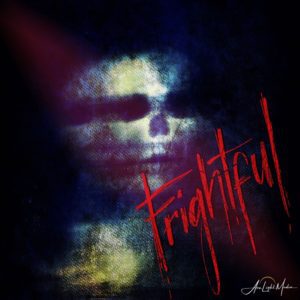
PopHorror: So that’s something you write, too?
Peter Laws: Yeah, I write it. I actually initially applied because that they were looking for a writer. I just applied to be the writer, and I wrote a script for them. They came back and said they really liked the script. The narrator that they had at the time narrated that script. But then they said, “Actually, would you like to try writing an episode?” And so I did. And then they came back and said, “You know what, we actually would like you to consider writing them all and narrating them all.” So I basically became the host. So now I’m doing doing that, which is which sort of fun.
PopHorror: What other projects do you have going on?
Peter Laws: I’ve been involved with a BBC show recently called Uncanny, which looks at true life tales of the paranormal. I was brought in as a so-called expert when it came to a case about a man who had witnessed two weird apparitions in his bedroom, and one of them, he was convinced, was evil. It was quite an interesting case, actually. So I was brought in as an expert for that, and then I’m going to be going back to do something a bit more for them later in the month. I’m a bit open now that COVID is thankfully less, so I’m getting back out on the the speaking circuit, which is nice. So in a few weeks time, I’ll be going up north in England, and I’m speaking at the UK Ghost Story Festival 2021, and then I’ll be leading some writing workshops and doing various like things like that there.
At some point, I’d love to write another book. And really, it’s just time that’s stopping me. It’s also that I’m realizing that writing books isn’t the best way to make a living. So yeah, you have to be wise with how you spend your time. If you don’t need to make the money, then great. But if you do, then you’ve got to be wise with how you spend your time.
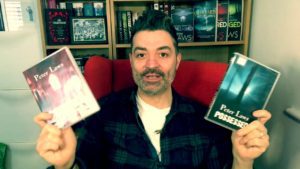
PopHorror: I have one more question for you: if you could schedule a horror movie double bill at the drive in for all your friends to see, what would you schedule?
Peter Laws: Oh, what a brilliant question.
PopHorror: I knew you would like it.
Peter Laws: Okay, I have to think about this. If it was at the drive in and it was to demonstrate my attraction to horror to my friends, I think one of the films would probably be The Changeling, the George C. Scott film from 1980. I just adore that film. It’s such a rich, melancholy, great ghost story. And I think it’s probably scary. It scares me even now when I watch it. So I’d put that as the last film, because that’s quite a lovely way to end the night. As for the first film, I think it might be good to do something that demonstrates the fun aspect. So perhaps Reanimator, which has moments that are not very fun at all, but Reanimator is such a wild ride. I like HP Lovecraft. I think if I were to invite many of my friends, mind you, they would probably see the scene where the head starts giving head, get up to walk out and say, “What’s wrong with you?”
We want to thank Peter for taking the time to chat with us. Keep it tuned to PopHorror for more horror news, reviews, and interviews!
 PopHorror Let's Get Scared
PopHorror Let's Get Scared



